October 13, 2014 | Revolution Newspaper | revcom.us
If you would like to share remembrances, photographs or tributes please send to ClydeYoungMemorial@gmail.com.
Here is some of what is being sent by people as tributes to this wonderful comrade.
Updated November 16, 2014.
Clyde Young, 1949-2014
A Life Lived for the People...
and Full Emancipation
A statement from the Central Committee of the Revolutionary Communist Party, USA
Including photos, a 1990 interview "Down for Revolution," video and audio
My heart is broken at the loss of Wayne Webb. His life was an inspiring example of how those this system treats as "the worst of the worst" can become the very best that humanity is capable of. He was not just a precious comrade, but also a great friend—someone I have known since the 1970s and loved hanging out with: grappling together with questions of philosophy, politics, and art, joking and laughing, singing doo wop songs we both loved. I miss him terribly.
Bob Avakian
Remembrances of Clyde Young from His Family
(October 29, 2014)
A memorial for Clyde Young (Wayne Webb) was held in Chicago on Saturday, October 18. The following are remembrances from Clyde's family members at the memorial.
November 2, 2015
Missing Clyde Young
I am missing Clyde Young bad. This is a comrade that had a big influence on me "back in the day" when I was a young revolutionary and he took me, and others, under his wing. I felt really fortunate to be working with him. He was leading, but always full of questions—wanting to learn as much as he could from me about the sentiments and thinking of the masses I had been engaging with—while at the same time he was schooling me politically and ideologically and helping me to raise the level of how I was engaging with people. I think that is something that Clyde loved doing all his life—schooling young revolutionaries.
For a while we lived in the same house. I would come home and he'd be sitting in front of a typewriter, hammering on a report or drafting a speech, or thinking about a chess game he had on the kitchen table. Clyde was someone whose "university" had been the state youth reformatory and then the penitentiary, including that was where he taught himself the ability and discipline of studying and digging deeply into theory (including the game theory or strategies of playing chess!). Clyde told me stories about prison, about how his life had been a living hell of being incarcerated for just about all his teen years and into his early adulthood, about the rebellions in the prison that he was proudly part of and helped to lead. But he also talked about taking up the weapon of theory. How he read books like Frederick Engels' Anti-Durhing.
And Clyde had a hell of a sense of humor! If you came in the house after a long day or night of dealing with some intense shit, he would get at you, including using humor to rib you and loosen you up. "What's wrong baby bruh? Did you run into some Black nationalism out there? Well, you gotta expect that. What, you expect that ain't going to be out there? That's idealism. Those dudes are just porkchop nationalists." "Porkchop nationalist" was a term that came, as I understand it, from Huey Newton and the Black Panthers referencing Black nationalists who were non-revolutionary, who thought just returning to African culture would bring their freedom. They were not anti-capitalist and not revolutionary. There is a lot of that still around today!
But Clyde would get at you with humor to lift you up about these kinds of challenges.
On the other hand, if you walked in the house and tried to say something to Clyde but he was in some deep thought about something he would look up and, "What's the matter baby bruh, can't you tell I'm in a pensive mood? Can't you tell I'm deep off into something here—trying to solve some important problems of the revolution?"
I want to emphasize that even though Clyde went through all that hell in prison and it all had such a profound effect on him, nonetheless Clyde talked a lot about how the biggest turning point in his life was meeting and getting down with Bob Avakian. He told me that BA struggled with him about breaking with nationalism. Clyde had made that LEAP to becoming an emancipator of humanity. When you talked with Clyde, you could tell he cared just as much about the emancipation of people in Iran or El Salvador or Egypt or anywhere else as he did about Black people in the U.S. And he cared just as much about the emancipation of women! And those are big leaps for people to make!
We did political work together back in the early 1980s in Atlanta, Georgia, during the outrage of the Atlanta Child Murders, when more than 20 Black children were abducted and murdered. It was an extremely intense situation, because things were really suspicious about the murders, including how the local Black bourgeois mayoral political structure, the police, the GBI [Georgia Bureau of Investigation] and FBI were attempting to redirect the masses' suspicions about the murders away from evidence of the involvement of white supremacists. Meanwhile the terror of the murders and people not knowing when another child would disappear continued. Other comrades and myself were arrested and jailed several times for protesting the way the state was covering up the murders. And Clyde helped give us a lot of orientation about the importance of walking point and representing for the masses.
I really wish that Clyde was going to be at the Dialogue between Cornel West and Bob Avakian. I know he would just be beaming with excitement! When Bob Avakian's book Away With All Gods!—Unchaining the Mind and Radically Changing the World came out, Clyde did quite a bit of public speaking to engage with audiences about the book. I remember us walking across Sproul Plaza at UC Berkeley and Clyde being excited because BA had gone to school there and been there during the Free Speech Movement. And there was just a whole 'nother level of coolness to Clyde touring and representing for BA's Away With All Gods! Why? Well, I'll just let this from BA in BAsics say why.
BAsics 4:19
As for my friends, today there's all this nonsense about how Black people are just inherently religious—and that's a whole thing that gets me pissed off, it's just bullshit. These are socially conditioned things. A lot of my Black friends and a lot of people who influenced me later in life, like the Panthers, were going through the same thing I'd gone through, and recognized that these religious ideas and institutions are human inventions—and not very good ones. So some of my friends were still religious, but many of them were going through the same general kind of emancipating experience that I was in casting off religion.
I hope at the Cornel West and Bob Avakian Dialogue on Revolution and Religion, we can have some sort of moment for Clyde Young and a tribute display in the lobby so we can share with more people who this beautiful revolutionary communist was.
While we were in Ferguson, Missouri, standing with the masses against the murder of Michael Brown, and all hell was breaking loose, as things went on, at a certain point, I thought about Clyde and was concerned because I had not seen any writing from him on the revcom.us site or heard him speak out on the situation in Ferguson, and I knew he would be so proud of the masses in Ferguson for rising up, and I was hoping that he would also be proud of how we represented for the movement for revolution. But I knew his health was not that good, but I tried to push that thinking to the side and was just hoping he was busy with other important projects.
Listen, I'm going to say this. Folks need to step forward and fill Clyde's shoes. We all need to do that. But in particular, I want to put this challenge to other oppressed masses whose lives have also been a living hell likes Clyde's was—a life of being in and out of reformatories and prisons, but have now met the movement for revolution. Be like Clyde Young—keeping moving forward in that process, and get down with Bob Avakian and become an emancipator of humanity!!
Joey Johnson
de Colombia, 29 de octubre de 2014
Un hermano que no conocí en persona
Jamas conocí en persona a Clyde Young, es más, hasta hace unas semanas supe que este era su nombre. Para el año 2001 conocí a los Maoistas en Colombia, con 15 años y con muchas ideas erroneas y correctas, pero con el animo de querer cambiar la sociedad.
En este año el Grupo Comunista Revolucionario me presentó a un hermano, al Camarada X. Lleno de tanto contenido y animo la entrevista a él es un respiro de aire puro, ejemplo de como la materia puede cambiar, puede cambiar nuestro pensamiento, pueden cambiar las personas, y mas importante, pueden ser capaces de emancipar la sociedad. Para mi fue un golpe duro la noticia al leerla en la edición en línea del periódico Revolución.
Pero este es un mensaje para toda la humanidad, OTRA VEZ, nunca conocí en persona a Clyde Young, es mas, no conocía su nombre, pero para mí, es llorar la perdida de un hermano, un hermano de clase que dedicó su vida a la mas elevada causa, liberar a la humanidad, perseverando en la revolución comunista.
Puedes tener una familia de sangre, pero puedes tener miles de hermanos en el mundo, sin jamas saber quienes son, como son, cuales son sus nombres, pero están allí trabajando arduamente en la misma causa, con sacrificios inmensos, luchando por llevar adelante la lucha por el comunismo, con un amor por la humanidad que nos hace llorar cuando tenemos una perdida tan importante como la del Camarada Clyde Young, para mi, mi hermano el Camarada X.
J.
From Colombia, South America, October 14, 2014
Cómo la vida del Camarada X nos inspiró…
(How the Life of Comrade X Inspired us...
Read English translation here.)
Recuerdo que hacía 1991, cuando tenía 17 años e ingresé a la universidad, comencé a participar del movimiento estudiantil y me sentí muy atraído hacía la política radical de los maoístas, de los guardias rojos, el grupo juvenil impulsado por el Grupo Comunista Revolucionario. A los pocos meses uno de esos jóvenes revolucionarios me invitó a leer los “Cuadernos Rojos”, en cuyos primeros números se publicó capítulo a capítulo el libro “La ciencia de la revolución” de Lenny Wolff. Durante las vacaciones me los devoré… literalmente. Me encantaron por la claridad científica con que explicaban cómo funcionaba el mundo.
Hacía 1992 comencé a participar activamente en el movimiento por una educación al servicio del pueblo, impulsado por los guardias rojos. Ya era simpatizante de los maoístas. Desde el principio me sentí muy atraído por sus explicaciones científicas sobre la restauración del capitalismo en la Unión Soviética y en China, y sobre la supuesta “muerte del comunismo”, algo muy candente en ese momento. Comencé a entender lo que realmente eran el socialismo y el comunismo, y la necesidad de la revolución comunista.
Fue hacía esa época que el compañero responsable del núcleo de simpatizantes donde yo estaba me entregó el folleto “Vivo para la revolución, una entrevista al camarada X”. Me emocionó profundamente. Lo primero que me conmovió fue la descripción de cómo el sistema lo embutió en la cárcel desde muy niño, y eso me llenó de odio visceral hacía el sistema. En ese momento lo relacioné con lo que había vivido muy de cerca en mi pueblo, las masacres de jóvenes por la ultraderechista “mano negra”, y lo relacioné con las desapariciones de jóvenes que se estaban dando por ese entonces en Bogotá (a donde no hacía mucho había llegado) por parte de grupos relacionados con la policía.
Me ayudó a entender las cárceles como instrumentos de dominación de clase y parte de la dictadura de la burguesía contra el pueblo. Pero lo que más me sorprendió fue saber que en medio de la inmundicia de la cárcel, donde se concentra lo peor que el sistema puede hacer con la gente, gente como en camarada Clyde se levantaron y lucharon por salir de la inmundicia y convertirse en comunistas, luchadores por la emancipación de la humanidad. Eso me puso a pensar: Claro, carajo, SÍ SE PUEDE convertir a las masas más oprimidas en revolucionarios, ellas sí se pueden meterse en la teoría y práctica revolucionarias en la lucha por el comunismo, con la fuerza de un liderato auténticamente comunista. Esa entrevista me ayudó a entender que hacerse comunista no consiste en hacerse el chacho, el más duro entre todos, al estilo pandillero, sino en entender científicamente el mundo y luchar abnegadamente por liberar a toda la humanidad.
Otra de las cosas que empecé a aprender es la importancia de la autocrítica, y que un salto clave para hacerse comunista es saberla practicar y cómo tiene mucho que ver con superar la concepción burguesa del mundo y especialmente el individualismo. Igualmente sobre el papel crucial de la crítica para desarrollar un partido comunista de vanguardia, para desarrollar la colectividad, el espíritu de partido. Sin embargo, lidiar con ese aprendizaje no fue sencillo, y recuerdo que años después, el volver a leer la entrevista me ayudó a entender unas críticas muy agudas y duras que estaba recibiendo por parte de una camarada dirigente sobre el trabajo economicista que yo estaba desarrollando. Aprender del Camarada X me ayudó a disponerme a aceptar y entender la crítica que me estaban haciendo.
Recuerdo al Camarada X con mucho cariño y, a pesar de no conocerlo personalmente, fue alguien que repercutió en mi vida y jugó un papel en el proceso que me llevó al comunismo revolucionario. Siento un profundo dolor por esta gran perdida, pero a la vez su vida me inspira a meterme más de lleno y a aprender de él, a atreverme a dirigir, a atreverme a escalar las alturas y volar sin red seguridad, una lucha ideológica que hoy estamos librando aquí en Colombia, y en la cual el Camarada X está presenté. Hoy estoy leyendo sobre su vida, estoy volviendo a leer la entrevista y estoy aprendiendo mucho de este gran camarada, especialmente su espíritu y enfoque de ayudar y dar todo por desarrollar la colectividad, la cadena de conocimiento y la cadena de mando del partido. Y muchas cosas más… como ahora mismo con la necesidad de meterme a lidiar más con la teoría comunista…
A — 14 de octubre de 2014
tending fire
(in memory of wayne webb)
october 6, 2014
sometimes you just know—
sometimes you meet up with someone
who wears it all on their sleeve
and you want to come closer
because you just know—
like getting a glimpse of a campfire
on a cold dark night
after a journey of miles and decades
and on such a night
you get a glimpse of a campfire
and you just know at first glance
that if you get closer,
the warmth of that fire will embrace you
like a big friend
with a big heart,
with a big embrace,
and a very big smile
who has kindled this fire and keeps it fed
(even for travelers like you)
who keeps it fed and keeps on searching
restless and relentless through forest and trees
for the finest wood which
can stoke the most awesome and undeniable flame
and you sit down around it
and break bread with the fire tender
and, yes, you can take comfort
but it's a comfort that makes you restless
as you listen to all the stories—
restless like a campfire aching to break out and grow
into something you dream about
warmed up in the company of the fire-tender,
like a big friend, with a big heart,
a big embrace, and a very big smile,
you collect some embers from the campfire
you venture ahead now, restless and relentless
on solid earth, beneath infinite sky—
and you hear somewhere along the way
that your big friend's flame is gone
and as tears fall on the path before you
you reach for the embers that you were given
that you took while breaking bread with the fire-tender
that you have carried and cared for
and you know that they can be kindled once more
you stoke them and carry on
restless, relentless through forest and trees
in search of the finest wood
to light the most magnificent and undeniable flame
which you keep feeding in the cold dark night
so it might break restless from its confines
and grow into something you dream about
sometimes you just know
sometimes someone will wear it all on their sleeve
and you want to come closer...
by d.r.
Painting from a revolutionary artist in Colombia
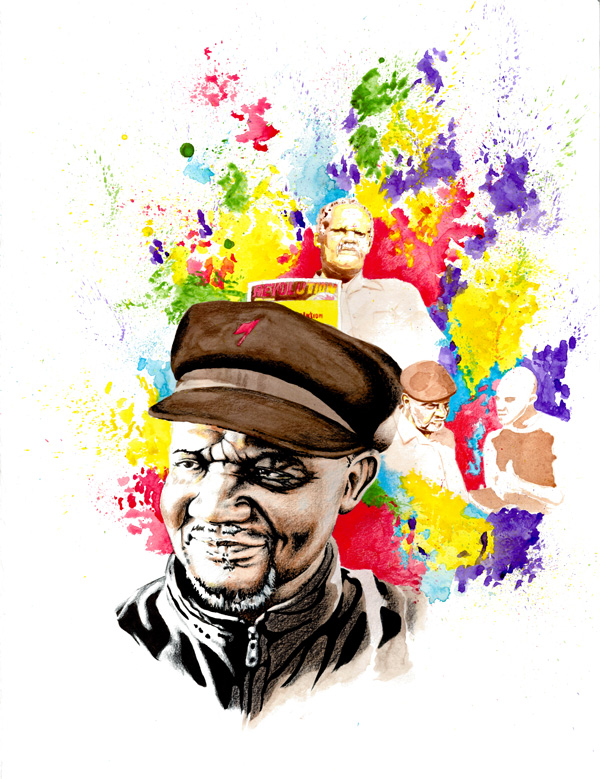
This painting was sent to Revolution newspaper from Colombia. The artist, upon learning of the loss of comrade Clyde Young, was moved to work tirelessly to create this artwork, as his contribution to the tributes that will be celebrated in some cities in Colombia organized by the Revolutionary Communist Group (Grupo Comunista Revolucionario,Colombia). They wrote that Clyde Young's life was inspirational to many revolutionaries in Colombia. They had published as a pamphlet the "Interview with Comrade X" in 1991 and this played an important role in organizing a youth group led by the GCR at that time. In 2011, those who were inspired by this Interview when they were young recommended that it be reprinted to inspire a new generation. They ask that this artwork serve as one of their tributes to his life.
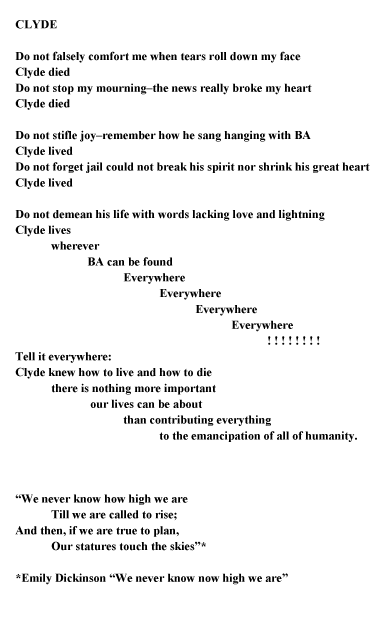
Clyde and his partner were among my closest comrades and friends for many years. I really miss him.
Clyde was always very firm that with state power, the masses of people, closely connected with their revolutionary leadership, could change everything—how people lived, how they related to each other, what life would be like. This is something he kept returning to.
He deeply understood the importance of leadership that could lift the whole of humanity higher than it had been before, and struggled with those both in the movement for revolution and outside it, to understand the historic nature of what Bob Avakian was developing. That without that kind of leadership a truly liberating revolution would not be possible.
Clyde knew how difficult it was for those who had been in prison, or who were coming from the life of the streets, to take up the communist ideology and become emancipators of humanity. He understood that the pulls of what it took to survive in prison, the pull of wanting revenge, were all very strong. But he challenged anyone who thought hatred for one’s own oppression was enough, to think about what a horror a society would be if getting revenge was what it was all about.
A number of people have spoken about how he tried to live the relations with people that we would fight to bring into the future. That was based on his understanding that things could be transformed, and on a way of looking at the world and people. He was not empiricist about people. By this I mean that he understood that what people said and did at any particular point was not the whole of that person, that they could have contradictory thinking at the same time, and that what people said and did was the product of them acting in, and on, very specific historical circumstances, which can change. He loved being part of the process of struggling and working that through.
To give a very personal example, in the early 1990s I watched with horror and anger as the U.S. bombed Baghdad and other cities in Iraq, and the incineration by the U.S. of Iraqi troops that were retreating. At one point I got a call that my mother had died. As we fought to resist the U.S. war, I was having a very hard time dealing with her death. Feeling like I shouldn’t be as upset as I was given the horror that the people of Iraq were facing.
Clyde heard about what I was going through and suggested we meet up. I struggled with telling him what I was thinking, and I finally told him that it seemed like by being so affected by her death, I wasn’t rising to what was needed of communists at that moment. Specifically I mentioned the comment Guzman, who was then the leader of the Peruvian revolution, had made at the end of a pamphlet, “I have comrades, not friends.” Clyde kind of raised his eyebrows and looked at me and said, “I don’t think that’s right. We’re human beings taking up a revolutionary ideology, not instruments without feeling.” He commented that for many of us who became revolutionaries in the sixties, an initial form of fighting against the system was resisting and fighting against the views of our parents. As we came to understand that it was a system that needed to be fought, we sometimes had regrets about the nature of our relationships with them. Pulling back the lens, situating things in a much broader and historical context, and on that basis giving insight about how to approach the particular—that was his approach.
I miss struggling through ideas together, struggling over line, laughing and pulling practical jokes all the way through it, listening to music. I miss, after coming out of his doctor’s appointments, hearing “I just have a quick stop to make”—and the detour to the corner in the neighborhood a couple blocks away, where in warm weather, there were always a couple of card tables set up under the trees for chess players. I miss that no matter how long it had been since he had seen you, he was quick with the next punch line in a long-running joke.
In working with him, comrades really had a sense of being a part, on whatever level they could contribute, of an exciting scientific process of discovery about how to radically transform the world—one which was full of all the life that human beings are capable of.
His life is a challenge to all people, including those whose lives today are like his early life, to become part of the movement for revolution, to take up the science of revolution that has been developed further with the new synthesis of Bob Avakian, to make this world a completely different place, and to live as best they can like he did.
D. 11/01/2014
From one of Wayne's long time physicians:
Dear [Clyde's partner],
Please forgive me that it has taken some days to get back to you. In contacting many of the physicians, nurse practitioners, and nurses that cared for Wayne, the outpouring of emotion has made it clear to me how much he connected with them and them with him and how much they cared about him and respected him.
As I mentioned a few days ago when you asked about whether to donate Wayne's body to science, Wayne had already given more than most of us ever will, to medicine and medical education. This may not have been his conscious intention but he did. I am not sure how he did it but he somehow achieved the right balance of friendliness and assertiveness and in so doing he taught all of us who cared for him. He made us into better doctors, nurses and nurse practitioners. Because of who he was and how he related to people, he was always Wayne and never his illness, no matter how sick he was. By example, he taught us to remember that our patients are people with lives and interests outside the hospital and aspirations that go beyond clinic goals. And that we should never make any assumptions about what our patients want. He reminded us that we should always communicate plans and results with our patients as well as with other doctors caring for our patients. He reminded us to listen and to treat people with dignity, because that is what he did. He always treated people that cared for him respectfully. He also challenged us but in a good way, because he was so smart and he always asked questions and did his homework. He would research issues, analyze the information, and then ask the tough and sometimes unanswerable questions. But he was so smart that he also understood that sometimes there were no clear cut answers.
But after all is said and done, I think his secret was that that he lived by the golden rule and in so doing, all of us that worked with him by his example were reminded to treat others as we would like to have ourselves treated.
My thoughts are with you and your family.
Additional note from the doctor after reading the material from revcom.us which was printed and given to her as a packet:
Thank you so much for the packet of information about Wayne and the interview…I started to read it last night and I have to say it explained a lot of things. And what you said about his living the social relations he wanted to see in the new society makes sense as well and explains what I always got from the way he handled himself and interacted with others but I was unable to articulate the issues….
This (news of Clyde’s death) came to me during my seminar on Melville. I write to you now to say how sad this makes me….I have just been looking at our correspondence from August. He was a life force, a person of such sensitivity, grace, and wit.
I will miss Clyde: his e-mails were always an anchor in these dread times, and he took his ethics straight-on, a being in proximity to and in relation with. For him, life was too serious for any instrumental moralism.
He was also so very kind.
Colin Dayan
Professor, Vanderbilt, and author, The Law is a White Dog
Artwork sent to the memorial in Chicago:
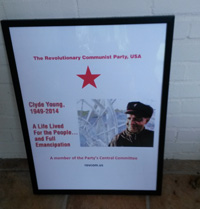
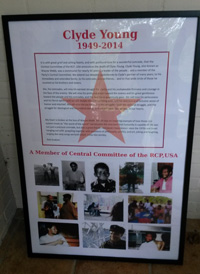
Remembrances of Clyde Young
from JD
10/10/14
Clyde was an extraordinary comrade and person. He had a great love for the people. A largeness of mind and a gentleness, he was always eager to engage with everyone he encountered. He would often give people nicknames, based on historical or cultural figures, even in brief encounters. For example one comrade, Drew, became “Noble Drew Ali”. New acquaintances would feel welcome.
He was what George Jackson used to call a “proletarian intellectual”. He pursued many areas of thought related to his tasks and work. At any time there might be titles Fragments of Anarchist Anthropology; A Brief History of Time from the Big Bang to Black Holes and The Meaning of The Holy Koran on his desk. His bookshelves were always overflowing and they would be stacked to the ceiling as he would be reading late into the night.
Clyde fought with great vigor and skill for BA’s line. He was patient but firm. Always from the broadest horizons and the great tasks before humanity he fought for comrades and others to rise to the challenges before us. He gave no quarter to the pulls of the system. For my own self, when I was having difficulty with some of the sacrifices doing work in a city where we had no organization and few ties or being away from family for long periods of time, he would remind me that a communists do not always act like communists and encourage me to reread that essay. He had a way of making you laugh at your own backwardness.
Clyde gave his whole heart and all his energy to the work of building the Party and the movement for revolution. He worked tirelessly when giving leadership to the new initiatives he was leading. He grasped the difference it could make if we succeeded and what it would mean if we didn’t he put his whole self into it. Sometimes to the point of exhaustion.
Clyde’s death is a great loss. For me it has been an honor to have known and worked with him. I will carry his memory and spirit with me always.
The party and the masses have suffered a major loss with the passing of Clyde Young. I first met Clyde in July of 2007. Actually I had seen him speak in 2006 when he was part of the RC4 speaking tour that crossed the nation. He was polemicizing during the Q&A with a person who had raised the exception of Constantine Christianity as being something historically positive for the masses. Then I learned that Clyde was the person behind Comrade X which had been serialized in the Revolutionary Worker. And again published in the book Bandana Republic available at Amazon.
He had a big heart and a warming personality. If he liked you, he would “mess with you” (play funning jokes on you). I remember one time, during the cultural revolution in the party that he was sitting around with a number of people and the subject came up about the slogan being popularized “Fight the Power, Transform the People, for Revolution". He broke the slogan down, interrogating it, and as he presented this to us he was moved to tears. He explained how this slogan is a valuable contribution in taking revolution to the masses and that his tears where a manifestation of his love for people. I was very moved by this.
I remember him as a great Huxley in promoting the work of Bob Avakian and I still remember a speech he gave at UCLA promoting BA’s new book, Away With All Gods. The art work from Columbia captures the radiance that Clyde exuded. It is an honor to have known him.
I wish he could have been able to attend the Dialogue.
A reader of Revolution
More paintings from a revolutionary artist in Colombia
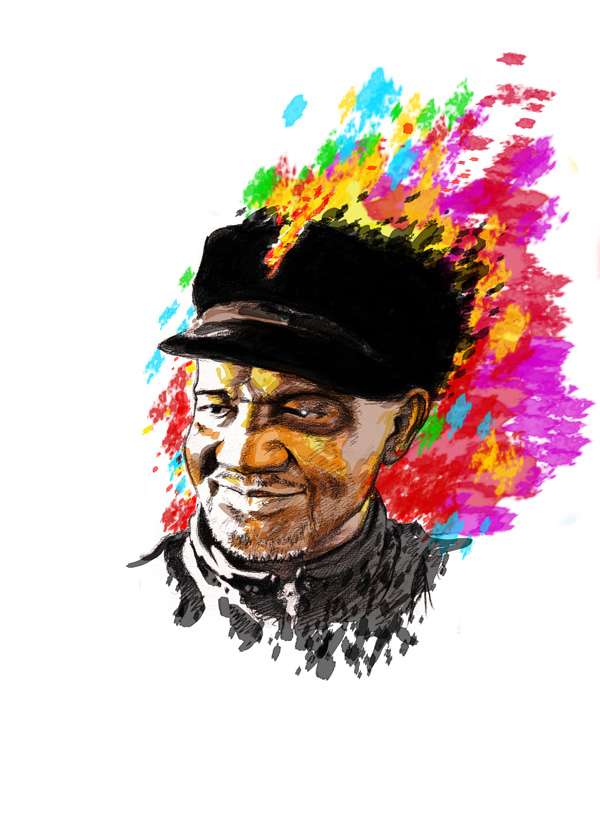
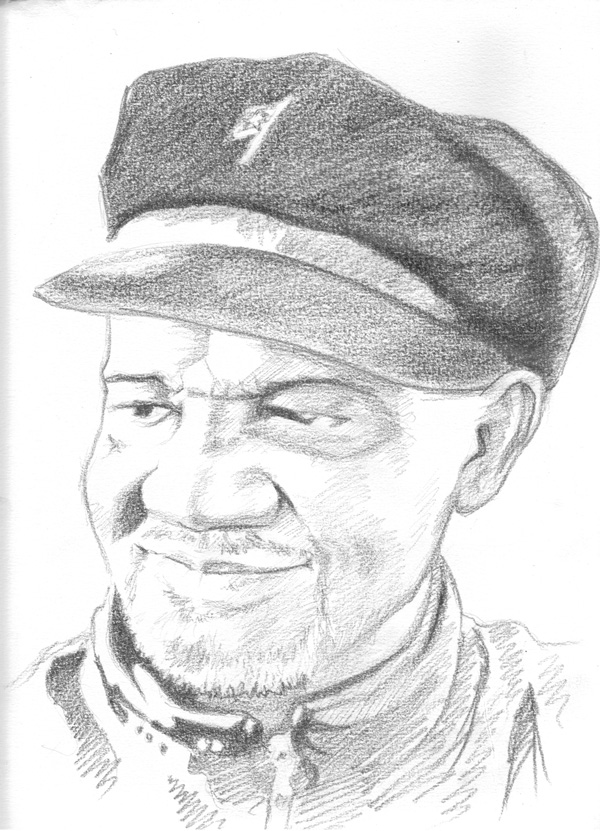
I offer my deepest condolences to the family and close friends of Clyde Young. This is a shock and a loss to humanity. While my work with him was short, his conviction to human emancipation, and intellect of how to do so, coupled with humorous wit were enough to convey a life time of information within the smallest periods of time. I am honored to have worked with him. He will be greatly missed.
A.B. sent on October 8
Sent to revcom.us on October 8:
Really very sad news for all comrades world over. Our condolences are with the family and the party.

